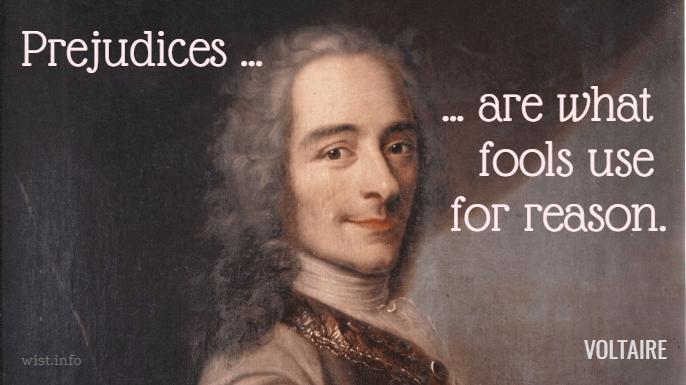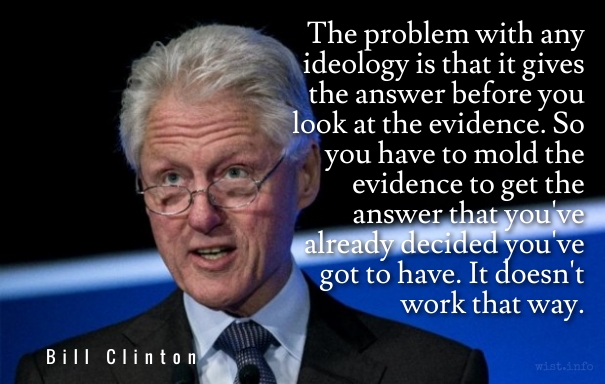You dull your own perceptions
with false imaginings and do not grasp
what would be clear but for your preconceptions.
[Tu stesso ti fai grosso
col falso imaginar, sì che non vedi
ciò che vedresti se l’avessi scosso.]Dante Alighieri (1265-1321) Italian poet
The Divine Comedy [Divina Commedia], Book 3 “Paradiso,” Canto 1, l. 88ff (1.88-90) [Beatrice] (1320) [tr. Ciardi (1970)]
(Source)
Dante's beloved Beatrice greets him for the first time since his arrival in Paradise, chiding him for his terrestrial assumptions of what he's seeing. (Source (Italian)). Alternate translations:
False Forms deceive thy optics. Son of Man!
With shadowy objects which eclipse the true.
[tr. Boyd (1802), st. 20]
With false imagination thou thyself
Mak’st dull, so that thou seest not the thing,
Which thou hadst seen, had that been shaken off.
[tr. Cary (1814)]
Imagination false
Hath made thee dull, so that thou canst not see
That thou might'st, hadst thou looked diligently.
[tr. Bannerman (1850)]
Thou makest thyself so dull
With false imagining, that thou seest not
What thou wouldst see if thou hadst shaken it off.
[tr. Longfellow (1867)]
Thou thyself makest thyself gross with false imagining, so that thou seest not that which thou wouldest have seen, if thou hadst shaken it off.
[tr. Butler (1885)]
Thyself thou makest blind
With thy false fancy, that thou canst not see
What thou wouldst see, if this were thrown behind.
[tr. Minchin (1885)]
Thou thyself makest thyself dull with false imagining, so that thou seest not what thou wouldst see, if thou hadst shaken it off.
[tr. Norton (1892)]
Thou thyself makest thyself dense Earthly with false imagining, and so thou seest not what heavenly thou wouldst see, if thou hadst cast it off.
[tr. Wicksteed (1899)]
Thou dullest thine own wit
With false imagination, nor preceivest
That which thou wouldst perceive, being rid of it.
[tr. Sayers/Reynolds (1962)]
Thou makest thyself dull with false fancies so that thou canst not see as thou wouldst if thou hadst cast them off.
[tr. Sinclair (1939)]
Thou makest thyself dense of wit
With false fancy, so that thou dost not see
What thou would’st see, wert thou but rid of it.
[tr. Binyon (1943)]
You make yourself dull with false imagining, so that you do not see what you would see had you cast it off.
[tr. Singleton (1975)]
You are making yourself stupid
By imagining what isn’t, so that you do not
See what you would if you could shake that off.
[tr. Sisson (1981)]
You make yourself
obtuse with false imagining; you can
not see what you would see if you dispelled it.
[tr. Mandelbaum (1984)]
You have yourself to blame for burdening
your mind with misconceptions that prevent
from seeing clearly what you might have seen.
[tr. Musa (1984)]
You are making yourself swell
with false imagining, so that you do not see
what shaking it off would show.
[tr. Durling (2011)]
You make yourself stupid with false imaginings, and so you do not see, what you would see, if you discarded them.
[tr. Kline (2002)]
With false imaginings
you make yourself so dull you fail to see
what, shaking off this cloud, you’d see quite well.
[tr. Kirkpatrick (2007)]
You make yourself dull-witted
with false notions, so that you cannot see
what you would understand, had you but cast them off.
[tr. Hollander/Hollander (2007)]
You're overwhelming yourself with false
And foolish conjuring, preventing what your eyes
Would see if you did not struggle so hard for triumph.
[tr. Raffel (2010)]
You get all mixed up
By sticking with a figment of your imagination, so
You don’t see what you would see if you shook it off.
[tr. Bang (2021)]
Quotations about:
preconception
Note not all quotations have been tagged, so Search may find additional quotes on this topic.
Once a man’s understanding has settled on something (either because it is an accepted belief or because it pleases him), it draws everything else also to support and agree with it. And if it encounters a larger number of more powerful countervailing examples, it either fails to notice them, or disregards them, or makes fine distinctions to dismiss and reject them, and all of this with much dangerous prejudice, to preserve the authority of its first conceptions.
[Intellectus humanus in iis quae semel placuerunt (aut quia recepta sunt et credita, aut quia delectant), alia etiam omnia trahit ad suffragationem et consensum cum illis: et licet major sit instantiarum vis et copia, quae occurrunt in contrarium; tamen eas aut non observat, aut contemnit, aut distinguendo summovet et rejicit, non sine magno et pernicioso praejudicio, quo prioribus illis syllepsibus authoritas maneat inviolata.]
Francis Bacon (1561-1626) English philosopher, scientist, author, statesman
Instauratio Magna [The Great Instauration], Part 2 “Novum Organum [The New Organon],” Book 1, Aphorism # 46 (1620) [tr. Silverthorne (2000)]
(Source)
(Source (Latin)). Alternate translations:
The human understanding, when any preposition has been once laid down, (either from general admission and belief, or from the pleasure it affords,) forces every thing else to add fresh support and confirmation; and although more cogent and abundant instances may exist to the contrary, yet either does not observe or despises them, or gets rid of and rejects them by some distinction, with violent and injurious prejudice, rather than sacrifice the authority of its first conclusions.
[tr. Wood (1831)]
The human understanding when it has once adopted an opinion (either as being the received opinion or as being agreeable to itself) draws all things else to support and agree with it. And though there be a greater number and weight of instances to be found on the other side, yet these it either neglects and despises, or else by some distinction sets aside and rejects; in order that by this great and pernicious predetermination the authority of its former conclusions may remain inviolate.
[tr. Spedding (1858)]
The human Intellect, in those things which have once pleased it (either because they are generally received and believed, or because they suit the taste), brings everything else to support and agree with them; and though the weight and number of contradictory instances be superior, still it either overlooks or despises them, or gets rid of them by creating distinctions, not without great and in jurious prejudice, that the authority of these previous conclusions may be maintained inviolate.
[tr. Johnson (1859)]
Once a human intellect has adopted an opinion (either as something it likes or as something generally accepted), it draws everything else in to confirm and support it. Even if there are more and stronger instances against it than there are in its favour·, the intellect either overlooks these or treats them as negligible or does some line-drawing that lets it shift them out of the way and reject them. This involves a great and pernicious prejudgment by means of which the intellect’s former conclusions remain inviolate.
[tr. Bennett (2017)]
“I truly don’t know her issues,” Weiss said. “But I’ve been in this line of work for a number of years, and my guesses are at least informed by experience.”
“Never a bad thing,” I said.
“Experience can inform,” he said. “It can also distort.”
“Sure,” I said. “But inexperience is rarely useful.”
But the problem with any ideology is that it gives the answer before you look at the evidence. So you have to mold the evidence to get the answer that you’ve already decided you’ve got to have. It doesn’t work that way.
The problem is never how to get new, innovative thoughts into your mind, but how to get old ones out. Every mind is a room packed with archaic furniture. You must get the old furniture of what you know, think, and believe out before anything new can get in. Make an empty space in any corner of your mind, and creativity will instantly fill it.
Dee W. Hock (b. 1929) American businessman
In M. Mitchell Waldrop, “Dee Hock on Management,” Fast Company (Oct/Nov 1996)
(Source)
Nearly always, the best deception trades on the enemy’s own preconceptions. If he already believes what you want him to believe, you have merely to confirm his own ideas rather than to undertake the more difficult task of inserting new ones into his mind.
ABSURDITY, n. A statement or belief manifestly inconsistent with one’s own opinion.
Ambrose Bierce (1842-1914?) American writer and journalist
“Absurdity,” The Cynic’s Word Book (1906)
(Source)
Included in The Devil's Dictionary (1911).
In later versions, Bierce added:
2. The argument of an opponent. A belief in which one has not had the misfortune to be instructed.
We usually see only the things we are looking for — so much so that we sometimes see them where they are not.
Eric Hoffer (1902-1983) American writer, philosopher, longshoreman
The Passionate State of Mind, Aphorism 238 (1955)
(Source)
The problem with ideology is, if you’ve got an ideology, you’ve already got your mind made up. You know all the answers and that makes evidence irrelevant and arguments a waste of time. You tend to govern by assertion and attacks.
In every object there is inexhaustible meaning; the eye sees in it what the eye brings means of seeing.
Thomas Carlyle (1795-1881) Scottish essayist and historian
(Misattributed)
Carlyle uses this phrase in his The French Revolution: A History, Part 1, Book 1, ch. 2 (1.1.2) (1837), but brackets it in quotations, and prefaces it with "For indeed it is well said ...." Nevertheless, the phrase is often misattributed directly to Carlyle.
The second half of the phrase (and sometimes the whole thing) has also been misattributed to Johann von Goethe, as "The eye sees only what the eye brings means of seeing." This is not found in Goethe's work, but may be distorted from a line in the Prologue to Goethe's Faust: "Each one sees what he carries in his heart."
Life is made up of constant calls to action, and we seldom have time for more than hastily contrived answers; to follow one’s hunch is usually better than lying doggo, and rough generalizations that have worked well in the past easily easily take on the authority of universals. It does violence to our inner being to be obliged to give a hearing to opinions widely at variance with those we are accustomed to, and to come to a conclusion unweighted by desire.
Learned Hand (1872-1961) American jurist
“At Fourscore,” speech, Harvard Club of New York (1952-01-18)
(Source)
First published in the Harvard Alumni Bulletin (23 Feb 1952).
I have no use for the strictures of You must. You must not.
[無可無不可]
Confucius (c. 551- c. 479 BC) Chinese philosopher, sage, politician [孔夫子 (Kǒng Fūzǐ, K'ung Fu-tzu, K'ung Fu Tse), 孔子 (Kǒngzǐ, Chungni), 孔丘 (Kǒng Qiū, K'ung Ch'iu)]
The Analects [論語, 论语, Lúnyǔ], Book 18, verse 8 (18.8.5) (6th C. BC) [ed. Lao-Tse, tr. Hinton (1998)]
(Source)
(Source (Chinese)). Alternate translations:
I have no course for which I am predetermined, and no course against which I am predetermined.
[tr. Legge (1861)]
I will take no liberties, I will have no curtailing of my liberty.
[tr. Jennings (1895); in the footnote he gives a more raw translation, "Without possibilities (or freedom to act) -- without impossibilities"]
With me there is no inflexible "thou shalt" or 'thou shalt not."
[tr. Soothill (1910)]
I have no categoric can and cannot.
[tr. Pound (1933)]
I have no "thou shalt" or "thou shalt not."
[tr. Waley (1938)]
I accept life as it comes. [tr. Ware (1950)]I have no preconceptions about the permissible and the impermissible.
[tr. Lau (1979)]
I avoid saying what should or should not be done.
[tr. Dawson (1993)]
I follow no rigid prescriptions on what should, or should not, be done.
[tr. Leys (1997)]
I have neither favorable nor unfavorable situation. [tr. Huang (1997)]I have not any stubborn positiveness or negation.
[tr. Cai/Yu (1998)]
I do not have presuppositions as to what may and may not be done.
[tr. Ames/Rosemont (1998)]
I have no "may" and no "may not."
[tr. Brooks/Brooks (1998)]
I have no preconceptions about what one can or cannot do.
[tr. Annping Chin (2014)]
This may be the source of Lin-Yutang, ed. The Wisdom of Confucius (1938):
The superior man goes through his life without any one preconceived course of action or any taboo. He merely decides for the moment what is the right thing to do.















